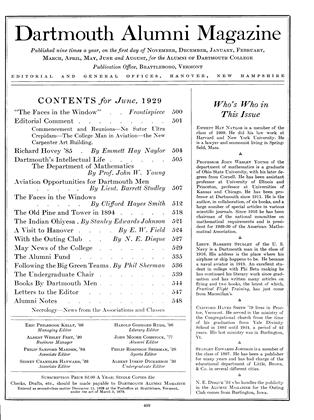J. R. BTTKLEIGH '14 and F. H. HOBAN '22 The speakers on this doubleheaded and very important subject had made a careful survey of their field and had obtained assistance from other secretaries in getting material. In considering the problem Mr. Burleigh divided the field into three groups: the newer classes, those one to ten years old; the older classes, namely those who had been through their fifteenth and twentieth year reunions; and the "antiques," the last classification, including the balance of classes from the twenty-five year class on, and so named because they needed no particular organization owing to their smaller numbers, and like all antiques declined in value if tampered with.
A questionnaire showed that few class secretaries were familiar with their class constitution and that in most cases it simply existed as something which might be amended at any reunion. Of the class officers the secretary was found to be the key man. He was, however, dependent largely on assistance from men selected for their fitness who might not even hold office in the class. Mr. Burleigh illustrated from the experience of his own class to show how the work was capably handled by men especially qualified but without official position. The class organization is intended to knit a class closer together and whatever means any class may devise for this purpose are valuable. Mr. Burleigh noted particularly the ALUMNI MAGAZINE and class bulletins and commented on the possibilities of a publication committee which may be effectively used.
In the financing of the class Mr. Burleigh outlined three methods: that of class dues, which suffers from the limited percentage of men who can be induced to pay even a small assessment; the class chest, which he felt lacked the important incentives of allowing an individual to distribute his gift as he might desire himself; and the plan of financing the class by an assessment at each reunion, which is in effect successfully with the class of 1911. In concluding his remarks Mr. Burleigh stated that the critical period in the life of any class was the first ten years and that greater care should be taken in its organization and in the selection of its officers than has been the case.
Continuing the discussion of class organization Frank H. Horan '22 devoted his attention particularly to the recent classes from 1920-28. He paid tribute to the secretaries who had been elected in recent years but regretted that election was usually due to popularity or prominence rather than to outstanding qualification for the secretarial office. He proposed radical changes in the class organization for their first years out of college. Those in Hanover interested in class organization should see to it that a well-qualified man was elected to the position of secretary and for the first three years out of college he should carry on to the best of his ability with the other officers. At the first reunion preferably, or at the third reunion surely, all the officers should go out by constitutional provision and new ones come in. At the head of the new organization should be a secretary- chairman who was the real head of the class and had the prestige of this position. His should be the responsibility and his the rewards. If he was not adapted to literary work himself he should have a class editor as an assistant but in general Mr. Horan did not consider this official necessary or desirable. The other officers should consist of a treasurer and a chairman of the reunion committee. The class agent was, of course, a necessary official of the class but he is usually appointed from outside sources. Class deputies in the various cities are also desirable but they might well be appointed by the class.
Discussion on these two stimulating talks showed the interest of the secretaries and also the variety of problems involved. It was finally moved and
VOTED: That the proposals for class organization as made by Mr. Horan be referred to the Executive Committee for consideration, action and report.
 View Full Issue
View Full Issue
More From This Issue
-
 Article
ArticleThe Faces in the Windows
June 1929 By Clifford Hayes Smith '79 -
 Article
ArticleAviation Opportunities for Dartmouth Men
June 1929 By Lieut.Barrett Studley,U.S.Navy -
 Class Notes
Class NotesCLASS of 1923
June 1929 By Truman T.Metzel -
 Lettter from the Editor
Lettter from the EditorEditorial Comment
June 1929 -
 Article
ArticleA Visit to Hanover
June 1929 By E.W.Field -
 Class Notes
Class NotesCLASS of 1898
June 1929 By H.Philip Patey
Article
-
 Article
ArticleNEWSPAPERS CONTINUE DISCUSSION OF PRESIDENT'S ADDRESS
December, 1922 -
 Article
ArticleMusical Clubs Give Five Concerts
DECEMBER 1927 -
 Article
ArticleFrom the Mailbag
April 1943 -
 Article
ArticleMedical School
February 1962 By HARRY W. SAVAGE M'27 -
 Article
ArticleClass of 1993
May/June 2008 By Julie Sloane '99 -
 Article
ArticleThayer School
JUNE 1968 By Russ STEARNS '38


